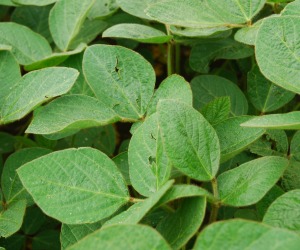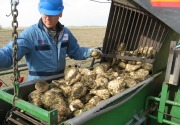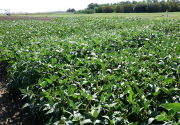| |
| |
 |
 |
| |
 |
|
MMMM d, yyyy |
|
| |
The federal government is encouraging Canadians to share their input to help shape A Food Policy for Canada – a move it calls an "important step in tackling the opportunities and challenges of Canada’s food system."
» Read more...
Farmers across the Prairies are planting record acres of canola, a crop that didn’t exist about four decades ago but now is the nation’s biggest, sown on more land than spring wheat.
» Read more...
Flooding, pests, disease and other extreme weather events are constant risks to the businesses and livelihoods of farmers. An online tool will help farmers have real-time assessments of the potential negative impact of risks to their businesses and provide mitigation solutions.
» Read more...
|
| |
 |
| |
|
| |

Prevention of plant diseases is key to management. Seed treatments are recommended to keep out root rots and prevent seed-borne diseases, but growers are reluctant to invest in seed treatments because it is an additional input cost. Pest populations build up over time, and seed treatments are key to preventing that build up. They are a good long-term investment, although they may not be directly profitable every year.
>> Learn more |
| |
|
| |
 Conservation management practices can increase sugar beet yields over time – that’s one of the key messages from a 12-year irrigated cropping study that compared conservation and conventional management. The study took place in southern Alberta’s Brown soil zone. It focused on three irrigated row crops: sugar beets, potatoes and dry beans.
» Read more...
Conservation management practices can increase sugar beet yields over time – that’s one of the key messages from a 12-year irrigated cropping study that compared conservation and conventional management. The study took place in southern Alberta’s Brown soil zone. It focused on three irrigated row crops: sugar beets, potatoes and dry beans.
» Read more... |
| |
 In Alberta, production is still relatively low at around 15,000 acres, according to industry estimates. Now, two collaborating soybean projects with agronomic, economic and varietal studies are nearing completion. The results will help create a solid foundation for soybean as a profitable crop option on irrigated land in southern Alberta.
» Read more...
In Alberta, production is still relatively low at around 15,000 acres, according to industry estimates. Now, two collaborating soybean projects with agronomic, economic and varietal studies are nearing completion. The results will help create a solid foundation for soybean as a profitable crop option on irrigated land in southern Alberta.
» Read more... |
| |
 |
| |
|
| |
June 22, 2017
Location: Portage la Prairie, Man.
» Learn More
|
| |
| |







